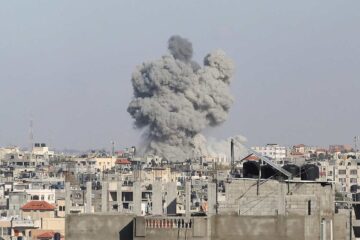Japan declares state of emergency as coronavirus cases climb, but experts fear ‘it’s too late’
 Pressure to declare an emergency grew after several days of record new infections in Tokyo, though the numbers are far smaller than in many parts of the world (AFP Photo/Behrouz MEHRI)
Pressure to declare an emergency grew after several days of record new infections in Tokyo, though the numbers are far smaller than in many parts of the world (AFP Photo/Behrouz MEHRI)Japan on Tuesday declared a month-long state of emergency over a spike in coronavirus cases, ramping up efforts to contain infections but stopping short of the strict lockdowns seen in other parts of the world.
The government has come under mounting pressure to tackle an outbreak that remains small by global standards but has raised concerns among Japanese medical experts, with warnings that local healthcare systems are already overstretched.
Announcing the measures, Prime Minister Shinzo Abe urged the Japanese people to draw on the sense of togetherness seen after the country’s devastating earthquake, tsunami and nuclear meltdown in 2011.
“We are again facing a great difficulty. However, if we work together once again with hope, we will rise to the challenge and move forward,” he said.-
“We will beat the virus, we will defeat the virus and we can overcome the ordeal of this state of emergency.”
The move allows governors in seven affected regions including Tokyo to ask people to stay indoors and request that businesses close, but there are no enforcement mechanisms and no penalties for those who fail to comply.
“Although a state of emergency is declared, it won’t mean a city lockdown as seen overseas,” Abe said, pledging public transport would run as normal and roads would not be blocked.
But he urged people to take the declaration seriously, telling citizens “everything will depend on your actions.”
And he warned that people would have to reduce contacts by 70-80 percent if the emergency was to be lifted in a month.
Pressure to declare an emergency grew after several days of record new infections in Tokyo, though the numbers are far smaller than in many parts of the world, with around 80 cases reported on Tuesday.
Tokyo Governor Yuriko Koike has already asked residents to avoid unnecessary outings and work from home, but had pushed for an emergency declaration to give her requests legal strength.
Seven regions are covered by the month-long declaration: Tokyo, neighbouring Chiba, Kanagawa and Saitama, the western hub of Osaka and neighbouring Hyogo, and the southwestern region of Fukuoka.
The measure will last through to the end of the Golden Week holiday, one of the country’s biggest travel periods.
– ‘Lives at stake’ –
“It may cause inconvenience in daily life, but I call for everyone’s cooperation because lives are at stake,” Koike told reporters earlier.
The measure also allows governors to commandeer property for medical purposes and close public facilities like schools, many of which have already shut down.
The economic impacts of the declaration and the broader global pandemic have raised concern of a recession in Japan, with Abe saying Tuesday that the domestic and global economy face their “biggest crisis since World War Two.”
His cabinet earlier approved plans for a stimulus package worth around $1 trillion, or 20 percent of gross domestic product.
Japan has so far been spared the sort of virus outbreak seen in parts of Europe and the United States, with close to 4,000 confirmed infections and 80 deaths.
– Public backing –
In a bid to ease the pressure on hospitals, those with mild symptoms will be treated in hotels and other facilities — including some that were to be used for this year’s now-postponed Olympic Games, Abe said.
The government has also pledged to step up testing capacity and the number of beds and ventilators available to treat those in serious condition.
The measures are relatively relaxed compared to other parts of the world, a function of Japan’s legal system, which restricts the government’s ability to limit the movement of citizens.
In the capital, people expressed support, with some saying they felt it should have been declared sooner.
“When you see on TV what’s going on in New York with the cases doubling within three, four days, it really sends chills down my spine,” 76-year-old Mitsuo Oshiyama told AFP.
“I don’t understand why the government waited so long.”
SOURCE: AFP











